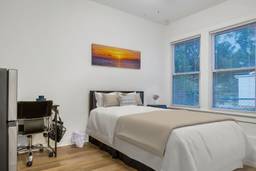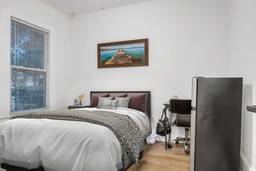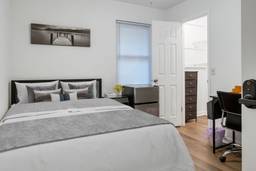Emanuel Premate, a PadSplit Account Executive in Jacksonville, Florida, recently became one of PadSplit’s newest hosts. After seeing first-hand the impressive returns other PadSplit investors were achieving, Emanuel decided to take the leap and invest in his first PadSplit home. After several months of planning, he purchased a single-family rental and converted it into a six-bedroom PadSplit in Jacksonville to accelerate his strategy to build wealth.
Why did you choose this investment strategy over other options?
When it comes to real estate investing, there are traditionally only two buy-and-hold exit strategies: long-term rentals and short-term rentals.
PadSplit now introduces a stable and profitable exit strategy that is a happy medium between the two. PadSplit boasts higher revenue compared to long-term rentals. Compared to short-term rentals, there’s a lot less turnover, as the average occupancy of a room is around 6-8 months. This translates to less vacancy downtime and more consistent income.
Additionally, PadSplit caters to a growing need for affordable housing, offering a potential hedge against economic fluctuations. Jacksonville is beginning to see tremendous growth, which means there will only be a further need for affordable housing.
How did you get a loan?
Much of my experience in real estate investing has been as an operating partner for short-term rentals and mid-term rentals. Over the last two years, I’ve built out a tech stack to systematize our cleaning management, guest communication, and pricing optimization for maximum occupancy and revenue.
This experience as an operating partner is what gave me the confidence to dive into my first PadSplit acquisition without any capital partners.
I was going into this new venture as a first-time home buyer. Thankfully, over the last year and a half since joining PadSplit as an account executive, I knew exactly what my buy box was going to be for this purchase.
My goal was to utilize a strategy that I call the “PadHack.”
Traditional house hacking is when a homeowner lives in the primary home and rents out an accessory dwelling unit (ADU), guest home, or mother-in-law suite. It’s a great way to generate revenue from your property to supplement your housing costs and provide affordable housing to members of the community.
The PadHack is similar to house hacking but even better. Let me explain…
Rather than living in the primary home and renting out the ADU, the PadHack is a flip on this strategy. You live in the ADU, and you PadSplit the main home. Not only will you be able to fully cover your housing costs, but you will also be able to make a decent profit. Assuming you can get at least six rooms from the main home.
The key to this strategy is finding a home that is in proximity to areas that have high demand for workforce housing. This means finding a home that is close to shopping plazas, restaurants/bars, hospitals, schools, warehouses, or distribution centers.
For the property itself, the main home should be at least 1,400 square feet and there must be an ADU on the lot.
The best part of this strategy is that you’re able to utilize FHA or conventional loan products, therefore reducing the amount of upfront capital needed to acquire the home. I purchased my home with a conventional loan that only required 1% down thanks to a federal grant for first time home buyers.
The one caveat to this strategy is that you will have to come out of pocket for your renovation/ conversion costs. That is unless you acquire the property using a renovation loan like the FHA 203(k) loan or the conventional Fannie Mae HomeStyle Loan.
It’s also very important to be transparent with your realtor, lender, and insurance provider to ensure everyone is on the same page and you have adequate hazard/liability coverage in place.
Can you share any numbers/metrics (even projected)?
Once I shared my buy box with my realtor, we walked three properties within a span of two months. The third one was a charm for me and I ended up putting in an offer. I was fortunate that my offer was accepted, and we went under contract.
During the inspection period, there were a lot of great things I uncovered.
The roof for both the main home and ADU were replaced within the last five years. The main home had a full foundation restoration in 2019 that included a lifetime warranty. The AC unit was in great condition as it had been newly installed in 2019.
But there were also a few issues I uncovered…
The listing marketed the property as being on city sewer, but I ultimately found out it was on a septic system. To make matters worse, after I got an inspection done on the septic system, I found out that both the tank and drain field had completely failed and required a replacement.
I also uncovered that both water heaters needed to be replaced for me to be able to close on the property.
This led my realtor and I going back to the negotiation table where we were able to negotiate $40k in seller concessions for the septic replacement and two brand new water heaters installed at closing.
The contract purchase price was $225,000, but after the seller concessions, the net purchase price was $185,000.
With the PadSplit conversion on the main home, the property will generate around $3,728 in revenue after taking into account a 15% vacancy. After subtracting utilities, maintenance, lawn care, pest control, taxes, insurance, and a monthly cleaning of the shared space, my net income will be around $1,900 per month. My monthly principal and interest payment is $1,397. This leaves me with a monthly net cash flow of $503.
The kicker in this deal is when I move out of the ADU, I will have two additional rooms that I can rent out on PadSplit which will generate an additional $1,700 per month.
What are your tips for making the PadSplit more profitable and having higher occupancy?
The longevity of a stay for a PadSplit member is a key driver to greater profitability and higher occupancy. This means that as a host, the member experience is more important than ever.
All of the rooms will be spacious and offer room amenities such as a mini fridge, work desk, and wall mirror. The kitchen will include a coffee maker, toaster, air fryer, blender, and pots/pans. I also will be providing cleaning supplies along with offering a monthly cleaning service of the shared space.
To reduce my maintenance expenses, I’ve included signs in both bathrooms and the kitchen alerting members that the home is on a septic system with sensitive pipes. I will also be providing this information as a reminder in my welcome message upon their move-in. To limit water usage, both bathrooms have only a standing shower. No bathtubs.
To minimize my electrical costs, I’ve included a smart thermostat that will lock the temperature at a comfortable range. I’ve also installed energy-efficient light bulbs throughout the entire home.
Any roadblocks during this process and ways to get around them?
The biggest roadblock has been miscommunication between contractors, which led to delays and rework. With the septic replacement and interior remodel, the total cost of the renovation came out to around $70k.
With this kind of project, there is a lot of coordination among various contractors. Throughout the flurry of work that needs to be done, miscommunication happens.
It’s critically important to have a plan with your contractors. Execute on this plan as agreed upon. Hold contractors accountable for when items are missed.
To sum things up, this experience has been one of the biggest growth experiences I’ve had in my professional investing career. Despite the countless challenges faced throughout the journey, it was all worth it to be able to do well and do good.





